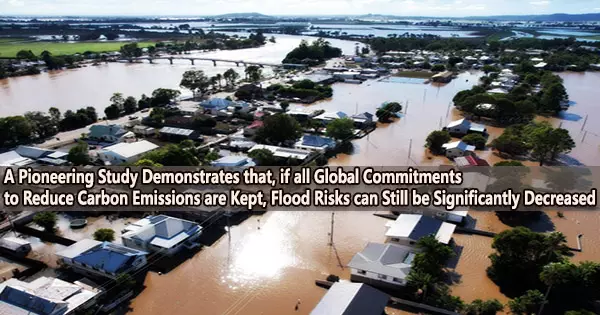According to recent study, unless all international commitments to cut carbon emissions are followed, annual damage from floods in the UK could rise by more than a fifth over the next century.
The study, which is being conducted by the University of Bristol and Fathom, a pioneer in global water risk modeling, presents the first dataset ever created to evaluate flood risk using the most recent Met Office climate projections, which take the expected effects of climate change into account.
The study’s findings demonstrate that the predicted annual rise in national direct flood losses physical damage to homes and businesses caused by climate change in the UK can be maintained to less than 5% above recent historical levels.
But only under the condition that all nations fulfill the lofty commitments they made at COP26 and that nations, like the UK, which made additional Net Zero commitments, actually fulfill these on schedule and in full.
If the COP26 and Net Zero promises are not collectively met, the study shows the annual cost of flooding in the UK over the next century could grow by between 13% and 23%, depending on different levels of climate extreme projections.
Lead author Paul Bates, Professor of Hydrology and Chairman of Fathom, said: “For the first time this flood model gives us a more accurate and detailed picture of the impact of climate change on the risk of flooding in the future across the UK.”
“The results are a timely warning to the country’s political leaders and business sector that global commitments to significantly reduce carbon emissions must be taken very seriously, and ultimately take effect, in order to mitigate increased losses due to flooding.”
The modelling provides clear evidence that flood risk needs to be a bigger international priority and that current governance doesn’t go far enough. While the majority of the nation’s future flood risk already exists today, it is strongly in the UK’s interest to exercise leadership in global carbon emission reduction efforts, both by example and as part of global diplomatic initiatives.
Dr. Oliver Wing
Even under the best-case scenario, where global warming is kept to 1.8 degrees Celsius, the advanced analysis has also shown the regions in the UK where hazards will rise most quickly.
These regions include South East England, South Wales, North West England, and Central Scotland. Particularly crowded areas like London, Cardiff, Manchester, Glasgow, and Edinburgh may see damage increases of over 25%.
Conversely, the new model indicated flood hazards in North-East and Central England as well as Eastern and Northern Scotland change very little from the present day.
“Although the most optimistic climate scenarios see only modest increases in flood losses at a national level, these new data demonstrate how this conceals dramatic variations across the country, with some places seeing large changes and others very little. This is a result of changing patterns of future rainfall, river flow and sea level rise, and this leads to the regional differences we predict,” said Professor Bates.
“We found that flooding increases most in places where risk is already high now, so the best thing we can do to prepare for the impact of climate change is to strengthen flood management in currently at-risk areas, and this will bring immediate economic and social benefits as well.”
The modelled estimates of historical flood risk, which are based on actual observations of river flow, rainfall, and tide-surge as well as climate model projections, match data on flood losses from the Association of British Insurers well and shed fresh light on the financial cost of floods.
The government’s estimates of past UK economic losses from floods were shown wrong in earlier studies by other research groups, but this is the first time the observed losses have been reproduced and supported by a computer model.
Our knowledge of how climate change is anticipated to effect flood risk internationally will be furthered by the study team’s analyses for other nations around the world.
Co-author Dr. Oliver Wing, Chief Research Officer at Fathom and Honorary Research Fellow at the University of Bristol, said: “This study, which harnesses new data and the very latest modelling techniques, validates Fathom’s UK Flood Map and has given a new level of insight into the impact of climate change on flooding in future.”
“The modelling provides clear evidence that flood risk needs to be a bigger international priority and that current governance doesn’t go far enough. While the majority of the nation’s future flood risk already exists today, it is strongly in the UK’s interest to exercise leadership in global carbon emission reduction efforts, both by example and as part of global diplomatic initiatives.”
















